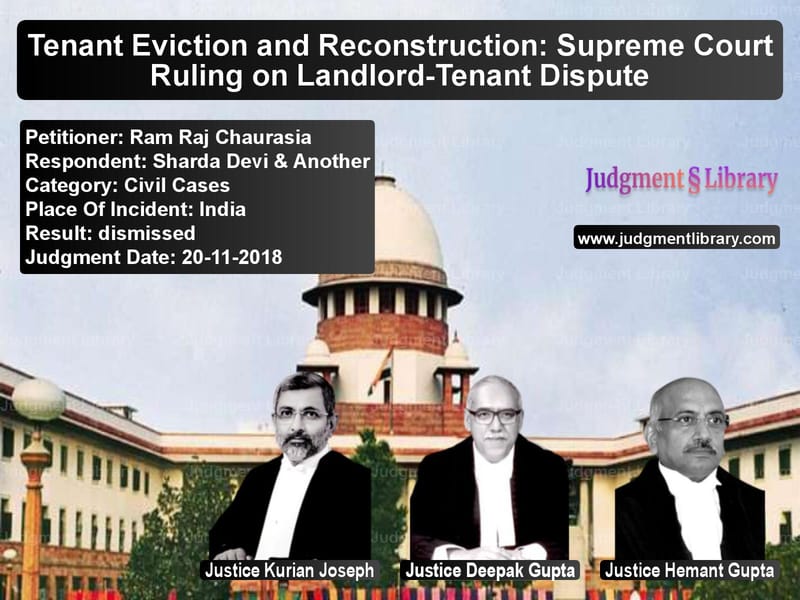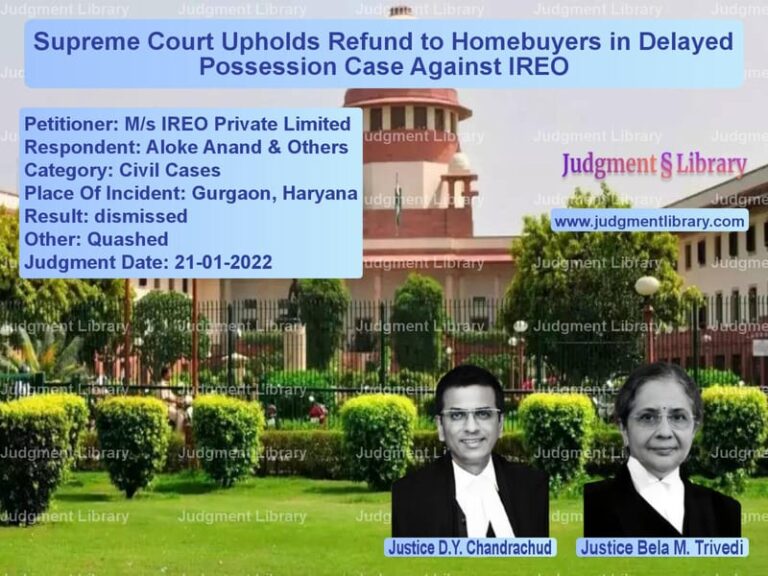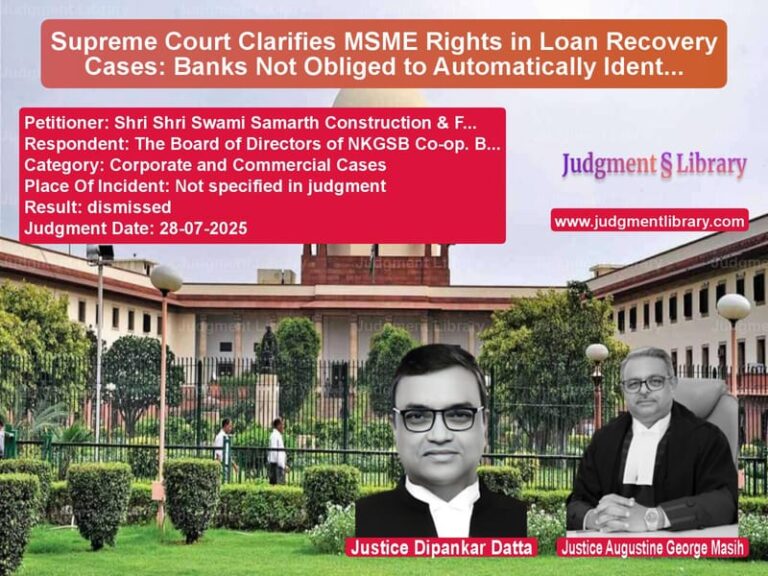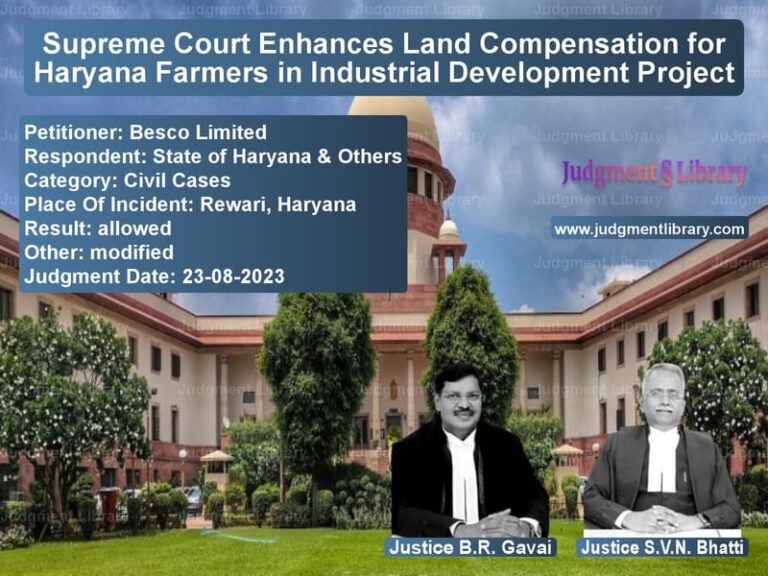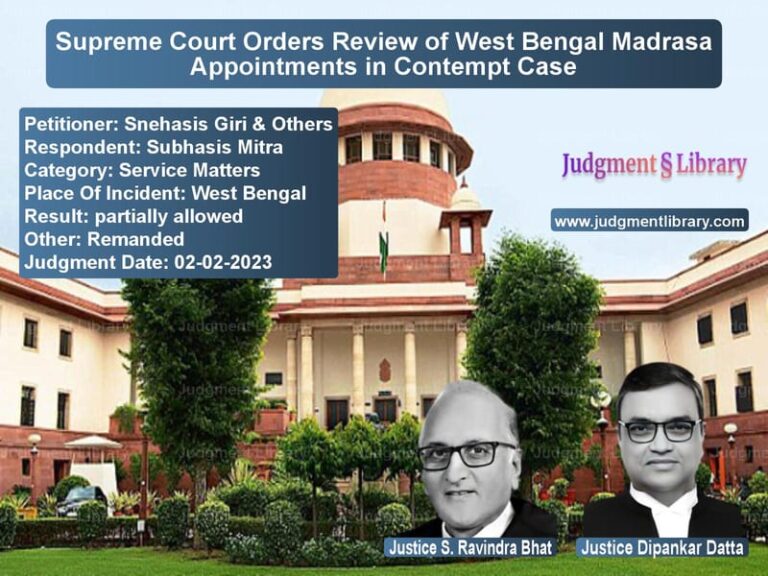Tenant Eviction and Reconstruction: Supreme Court Ruling on Landlord-Tenant Dispute
The Supreme Court of India recently decided the case of Ram Raj Chaurasia v. Sharda Devi & Another, addressing a dispute over the eviction of a tenant on the grounds of reconstruction. The appellant, Ram Raj Chaurasia, was a tenant who was evicted from the premises by the landlord, Sharda Devi, based on the claim that the property was needed for reconstruction.
The eviction order was executed in 2015, but the appellant later approached the Supreme Court, alleging that no reconstruction had taken place, and that there was collusion between the landlord and the builder to evict him under false pretenses. The Supreme Court reviewed the matter but ultimately ruled that since the eviction had already taken place, the appellant must pursue other legal remedies available to him under the law.
Background of the Case
The dispute arose when the landlord, Sharda Devi, sought the eviction of the tenant, Ram Raj Chaurasia, on the grounds that the building needed to be demolished and reconstructed. The eviction order was granted, and the appellant vacated the premises in 2015.
However, after several years, the appellant alleged that no reconstruction had taken place and that the eviction had been a fraudulent scheme between the landlord and the builder. He approached the Supreme Court to challenge the eviction and to request reinstatement of his tenancy rights.
Legal Issues
- Whether the eviction of the tenant was legally justified under the claim of reconstruction.
- Whether the lack of reconstruction after eviction amounted to fraud or collusion between the landlord and the builder.
- Whether the appellant had any legal remedies available to challenge his eviction after several years.
Arguments Presented
Appellant’s (Tenant) Arguments
- The tenant argued that he had been evicted under false pretenses, as the building had not been reconstructed even years after his removal.
- He contended that there was collusion between the landlord and the builder to evict him and deprive him of his right to livelihood.
- He requested the Court to reinstate his tenancy rights or grant him relief against the alleged fraudulent eviction.
Respondent’s (Landlord) Arguments
- The landlord countered that the eviction was obtained legally and in accordance with existing tenancy laws.
- She denied any collusion with the builder and argued that the delay in reconstruction was due to unforeseen circumstances.
- The landlord maintained that once the eviction was executed, the tenant had no legal right to reclaim the property.
Supreme Court’s Observations
The Supreme Court acknowledged the appellant’s grievances but held that once the eviction order was executed, the tenant must seek appropriate legal remedies rather than approaching the Court years after the fact.
The Court stated:
“Now that the appellant has been evicted, it is for him to work out his remedy available to him under law.”
The Court further noted that there was no representation from the builder, and there were conflicting claims from both sides regarding collusion. However, since the eviction had already taken place, the Court ruled that it could not reinstate the tenancy or interfere with the executed eviction order.
Final Judgment
- The Supreme Court disposed of the appeal, ruling that the tenant must seek alternative legal remedies.
- The Court did not comment on the allegations of collusion between the landlord and the builder.
- The judgment clarified that eviction orders, once executed, could not be easily reversed.
Implications of the Judgment
- Strengthening Landlord Rights: The ruling reinforces that landlords can legally evict tenants for reconstruction if the requirement is genuine.
- Tenant Protections Remain Limited: The case highlights the difficulty tenants face in challenging evictions after execution.
- Collusion Allegations Must Be Substantiated: The Court did not interfere in allegations of collusion without concrete evidence.
Conclusion
The Supreme Court’s decision in Ram Raj Chaurasia v. Sharda Devi & Another affirms that tenants who have been evicted under reconstruction claims must seek remedies through appropriate legal channels rather than attempting to reoccupy the premises through fresh litigation. This ruling underscores the importance of proving fraud in eviction cases and serves as a cautionary tale for tenants and landlords alike.
Petitioner Name: Ram Raj Chaurasia.Respondent Name: Sharda Devi & Another.Judgment By: Justice Kurian Joseph, Justice Deepak Gupta, Justice Hemant Gupta.Place Of Incident: India.Judgment Date: 20-11-2018.
Don’t miss out on the full details! Download the complete judgment in PDF format below and gain valuable insights instantly!
Download Judgment: Ram Raj Chaurasia vs Sharda Devi & Anothe Supreme Court of India Judgment Dated 20-11-2018.pdf
Direct Downlaod Judgment: Direct downlaod this Judgment
See all petitions in Property Disputes
See all petitions in Landlord-Tenant Disputes
See all petitions in Judgment by Kurian Joseph
See all petitions in Judgment by Deepak Gupta
See all petitions in Judgment by Hemant Gupta
See all petitions in dismissed
See all petitions in supreme court of India judgments November 2018
See all petitions in 2018 judgments
See all posts in Civil Cases Category
See all allowed petitions in Civil Cases Category
See all Dismissed petitions in Civil Cases Category
See all partially allowed petitions in Civil Cases Category

